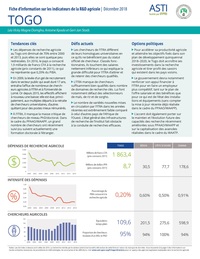Authors:
Léa Vicky Magne Domgho, Antoine Kpodo et Gert-Jan Stads
Year:
2018
Publisher
International Food Policy Research Institute and Institut Togolais de Recherche Agronomique.
Back to:
Key trends
- Agricultural research spending in Togo fell by 70 percent during 2000–2013, but has recovered somewhat since. In 2016, the country invested 1.9 billion CFA francs in agricultural research (in constant 2011 prices), which represents just 0.20 percent of AgGDP.
- The 17-year public sector recruitment ban, which was lifted in 2009, prompted the influx of a large number of agricultural researchers at ITRA and the University of Lomé. Since 2015, however, researcher numbers have started to fall again, mostly due to university staff leaving for greener pastures and retirement.
- ITRA has traditionally lacked a critical mass of PhD-qualified researchers. As part of WAAPP, a large number of researchers have recently undergone (or are currently undergoing) PhD training abroad.
Current challenges
- Unlike their university-based counterparts, ITRA’s researchers are not given official researcher status but are instead categorized as public servants. This means that their salaries are significantly lower, which makes it extremely difficult for ITRA to attract and retain well-qualified researchers.
- ITRA lacks a critical mass of well-qualified researchers in a number of key research areas. There are no maize, rice, or sorghum breeders.
- The number of new varieties released by ITRA in recent years is extremely low compared with other countries in West Africa. The institute’s overall rundown state of research infrastructure makes it extremely challenging for researchers to work effectively.
Policy options
- Togo needs to increase its own investment in agricultural research and take advantage of knowledge spillovers from neighboring countries in order to accelerate agricultural productivity to reach the goals defined in its 2018–2022 Five-Year Development Plan.
- In particular, the government will need to increase funding levels to enable ITRA to operate more competitively, both in terms of researcher salaries and benefits, and facilities and equipment (other than those recently upgraded under WAAPP).
- Moreover, it is important that recent WAAPP-supported researcher capacity improvements are maintained and continued, and that further advances made under WAATP will be capitalized.

